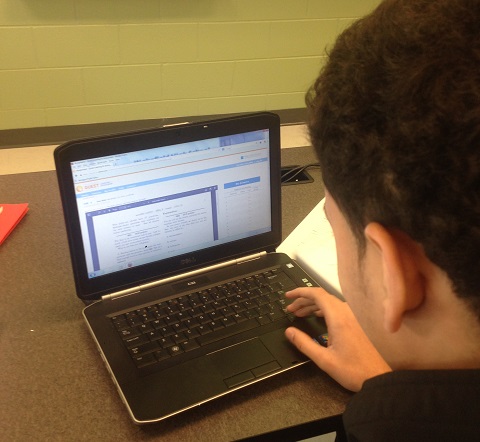The Quest For a Better Grade

Quest: helpful tool or burden?
January 24, 2014
Quest. The enemy of Thursday nights. UT Quest is a program developed by the University of Texas which provides an online homework service for teachers to use with their students. Anyone who has taken a math or science course has probably used UT Quest, however, not all teachers choose to use this service.
For those who have never used Quest, it’s pretty simple. On the left you’ll see what looks like a printout with a variety of word problems, some free response and some multiple choice (usually with 5 or more answers.) On the right is where you submit your answers, the program will immediately tell you if you were right or wrong and if you were wrong you have the chance to try more answers; sadly, you lose points every time you answer incorrectly. Most questions give you anywhere from 3-8 attempts to get a question right, and if you miss it completely, the system does not give you the correct answer. Every student has the same set of problems, however the numbers will be slightly different because Quest uses a random number generator to create its problems. Most problems have not changed for a number of years, so most times, if you can’t seem to figure out the problem, you have the option of googling the question and hoping it has already been answered somewhere online.
In theory, Quest is a very valuable and functional tool for students and teachers alike. “It’s always available to students via the internet” raves Mr. Lenowitz, a math teacher and Quest-enthusiast, “it provides immediate feedback and opportunities for [students to] correct their mistakes.” Some teachers enjoy it because of the real life application it has “because not just in a college environment, but in a work environment, virtually everything will be turned in on line” remarked Mr. Chauvenet, who doesn’t use Quest, but greatly admires the program. Dr. Megargee, identified both the negative and positive aspects of quest. “It’s a dangerous tool,” he began “it has a big benefit: it allows us [teachers] to have students do more challenging problems than we’d be able to grade on a daily basis,” however, as he continued he added that teachers must be vigilant about the lousy questions.”
Quest has it’s downsides, as Dr. Megargee pointed out. “The wording is not always great for english language learners” added Megargee, which is something that Wakefield must always keep in mind. Dr. Weirsma, who teaches Geometry, noted that the Quest questions for Geometry aren’t that great. She said that she doesn’t use it in her Algebra class because there isn’t enough access to technology and she feels it’s unfair to assign something that not everyone can do at home. Both teachers pointed out Quest’s largest problem: It’s run by humans, and humans make mistakes. “The right answer [hasn’t been] an option at least once” explained Dr. Weirsma. Dr. Megargee says that before he assigns a Quest, he will read over all the questions to make sure they’re all correct, but often he ends up scratching out one or two that even he missed initially.
So is Quest a great tool that prepares students for college, or is it more of a burden than it’s worth? Students have generally negative views about the service, despite acknowledging its benefits. “It’s nice because it’s hard not to get an A, at least in the Physics ones, because it allows you to try again” remarked Shannon Brady ’15, “but, we never go over it in class” she added, noting the fact that students never really learn how to get the problems that they got wrong, right. The problems being too hard seemed to be a common theme among everyone polled. “I had my math-degree mother do Quest with me and we still got them all wrong” stated Casey McClintic-Sink ’15. “I hate it because it makes you keep guessing” added Sean Balick ’15 regarding the difficulty. On the free response questions even if you consistently get a question wrong, there’s no way of knowing how to fix it, and when your teacher grades for 100% completion skipping a question isn’t an option. Casey offered a solution, “All teachers who assign Quest should have one Warrior’s Period a week where we go over it.”
Quest has other flaws too, since the numbers are randomly generated, every once in a while you’ll get a problem that keeps coming out negative when it can not possibly be a negative, or, my personal favorite, one answer is (x+0) and the other is (x-0), essentially the same thing, however (x-0) was the correct answer. It’s hard to say if teachers should continue using Quest or not, given the problems it has. In theory Quest sounds amazing and helpful to students, but in reality it can cause stress and may not reflect what the student actually knows. I have gotten an ‘A’ in my Pre Calculus Quest assignment, but get a ‘D’ on the quiz that covers the same material. I guess it boils down to this: which would you rather do, Quest once a week, or 30 homework problems every other night?





